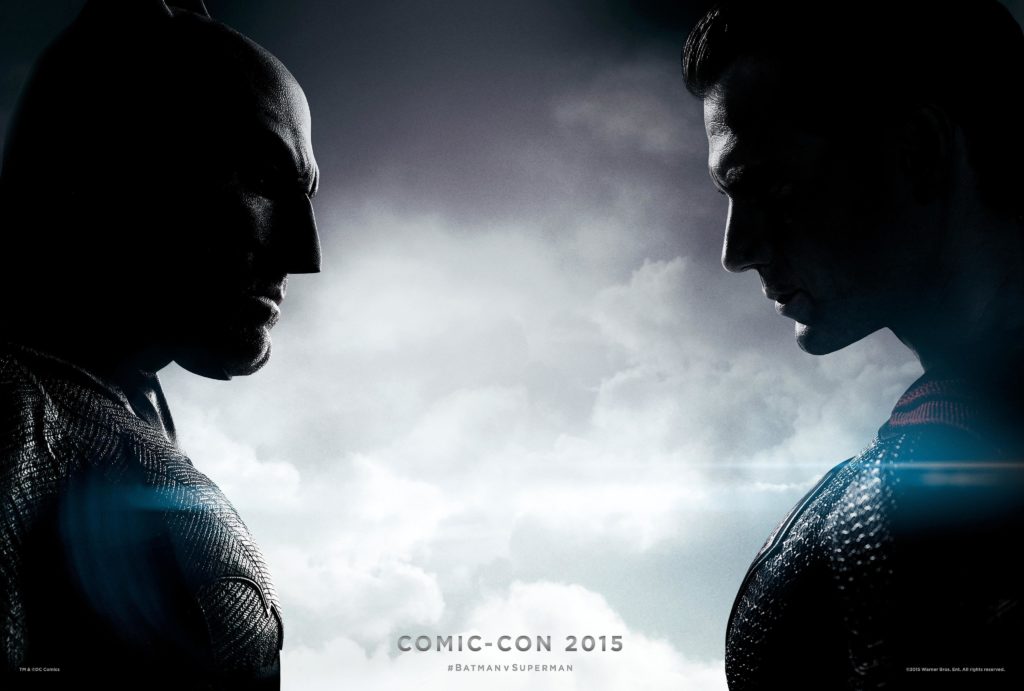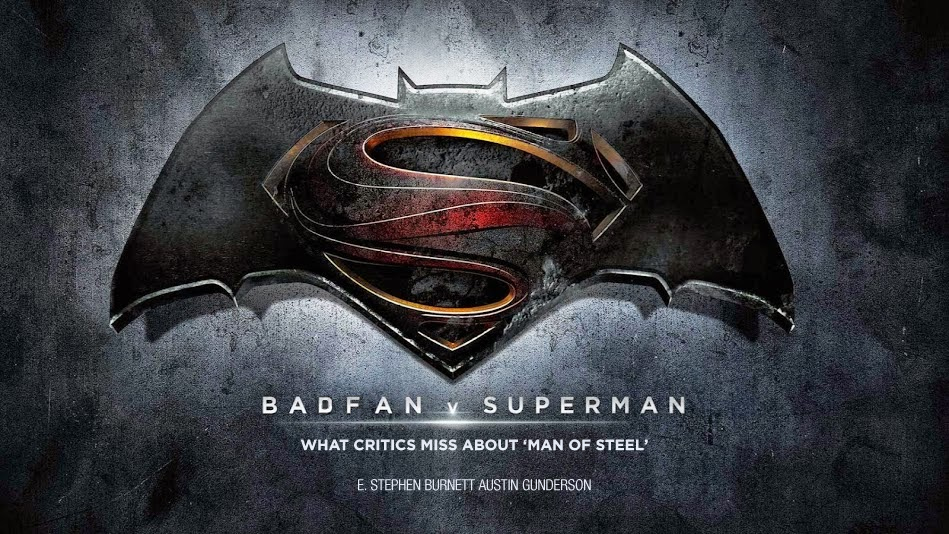Badfan v Superman 3: Challenging Cheap Optimism
On Saturday for San Diego Comic Con, Warner Bros. released trailer-style footage for the 2016 film Batman v Superman: Dawn of Justice. This is a sequel to 2013’s Man of Steel and no. 2 of a new film series that will include DC heroes such as Superman, Batman, Wonder Woman, the Green Lantern Corps, Aquaman, and The Flash.
Many fans misunderstand or issue flawed criticisms of Man of Steel, or of the very concept of superhero stories that tackle more-serious themes. Austin Gunderson and E. Stephen Burnett challenge this criticism in the Badfan v Superman series.
Read part 1, Dawn of Rebuttal Justice, or part 2, Super-Nostalgia Knockdown. Or see the entire Badfan v Superman series.
Stephen Burnett (from part 1): As I’m writing this the internet is all a-flutter about a video someone put together titled, “What if Man of Steel was IN COLOR?” That video release, after the release of the first Batman vs. Superman trailer and quite a lot of fan hubbub, convinces me that some fans are:
- Unconsciously going along with negative media narratives about Man of Steel (2013).
- Being a bit naive about how media narratives in general can co-opt our response to a popular story or song.
- Accepting some myths about “what Superman (or superhero stories in general) are Supposed to Be …”

Austin Gunderson:
As a professional video editor I can assure you that every Hollywood film undergoes an extensive and very intentional color-grading process. Color influences the viewer on a subliminal level. There’s a reason most war films are severely desaturated, most happy flashbacks have a golden tint, and most comedies and TV sitcoms look super vibrant: it elicits a specific emotional response. So the fact that Zack Snyder opted for gritty grays in Man of Steel should tell us something about how he wanted the film to be approached.
What MoS gave us was a serious take on Superman. The fact that, as you’ve recounted, previous incarnations of the character were cheesy at best (well, you didn’t categorize the first film as such, but I certainly do) means that, in order to strike a deeply sober tone, Snyder had to leave no emotional wiggle-room in the look and feel of his product.
I mean, the narrator in that “What If MoS Was IN COLOR?“ video says it best: bright, saturated tones “feel like a Superman movie.” And what he really means when he says that is, “A Superman movie is supposed to feel bright, happy, optimistic, and triumphant.”
Ah, and therein lay the chief obstacle Snyder had to overcome in order to tell a story worth watching: the assumption that everything’s gonna be okay because hey — it’s Superman!
Yeah, that kind of assumption just obliterates the potential of Superman to actually challenge the viewer. It transforms a scenario ripe with tension and philosophical fiber into a kind of safe, self-reinforcing mush: easily consumed, easily ignored.
But Snyder didn’t want viewers checking out with the comfortable assumption that Superman’s magic would once again win the day, even if it meant breaking all the rules of physics, reality, life, the universe, and everything. No, instead Snyder wanted the viewer to nervously slip on those big red boots, put himself in Supes’ position, and find to his disquiet that it doesn’t feel all that different. The scale may be grander and the blocks and punches faster, but the same moral dilemmas apply. Do you stand in the gap though you know others won’t like it? Do you choose to turn the other cheek even though you could break the other guy with your bare hands? And, if you do, at what point does restraint become complicity? How far do you go to protect those under immediate threat? How far is too far?
 A magical Superman who always gets his way can answer none of those questions. Indeed, he can’t even understand them. He can neither bear our griefs nor sympathize with our weaknesses. He’s a false fantasy, a figment of wishful thinking.
A magical Superman who always gets his way can answer none of those questions. Indeed, he can’t even understand them. He can neither bear our griefs nor sympathize with our weaknesses. He’s a false fantasy, a figment of wishful thinking.
Snyder’s Superman is different. As a child he must learn to master his unruly senses and restrain his righteous fury at senseless bullying. As a young man he must grapple with the legacy of an adoptive father who was willing to lay down his own life to keep Clark’s gifts a fear-shrouded secret. And as the Last Son of Krypton, Superman must defeat an ideologically-driven foe of equal strength and greater experience. Nothing comes easy for him. Nothing is a given.
And that’s precisely the sense in which he can give the people of earth an ideal to strive toward. Because he too has been through the fire and the darkness, same as us.
Doesn’t mean we’ll know what’s good for us, though, as the Batman v Superman trailer demonstrates. I find it astonishing that anyone would find this approach somehow forced, as though Snyder’s only interested in riding The Dark Knight trilogy’s coattails to the box office. To assume that humanity would respond appropriately to someone as fundamentally good — whether by nature or nurture — as Superman would be to ignore human nature itself. I mean, it’s not like we don’t know what happened the last time we saw perfection: “The light has come into the world, and people loved the darkness rather than the light because their works were evil.”1
Read Badfan v Superman 4: Able to Leap Expectations. Or see the entire Badfan v Superman series.
- John 3:19. ↩










































It’s easy for me because I don’t have any particular nostalgia or affection for Supes, but I see this argle-bargle around him more as death throes than rebirth. His legacy is more as an ideal than a character, and one-trick ponies just can’t really survive outside their specialized niches. It feels like Supes evolved to suit the Cold War more than anything else, with his “truth, justice, and the American way.” For better or worse, we’re no longer in the Cold War, and the American way is no longer what it looked like back then.
The American Way is like Tinkerbell: it dies because people stop believing in it, not vice versa. And if truth and justice are one-trick ponies, then I wanna ride them all the way into the sunset.